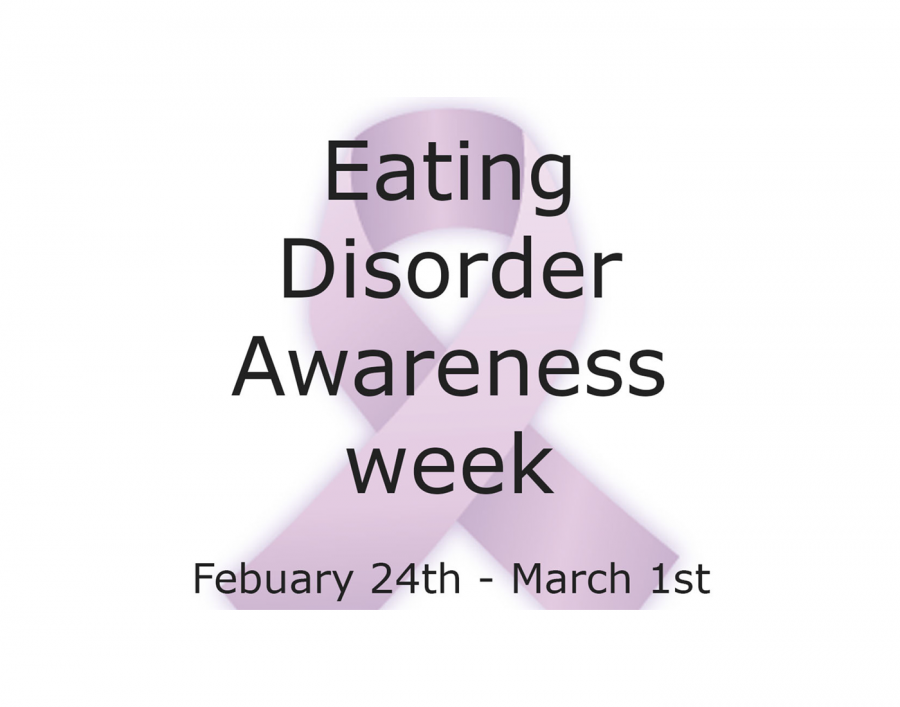Eating disorder awareness week
February 12, 2020
Eating disorders are an often silent group of disorders as its not uncommon for those suffering from an eating disorder to try to keep it under the radar. Even Artist of the Decade Taylor Swift has recently spoken about her struggle with eating disorders. She opened up during the Netflix documentary Miss Americana about the importance of spreading awareness on eating disorders.
The week of Feb. 24 – March 1 is known as Eating Disorder Awareness week. This week is dedicated to spreading awareness and breaking prejudices about eating disorders. There is a common misconception that eating disorders are a choice or a decision someone made, but eating disorders are serious disorders that can be fatal. And they can affect anyone, according to the National Association of Anorexia Nervosa and Associated disorders said, “There are 30 million people of all ages and genders currently suffering from an eating disorder in the U.S. Anorexia nervosa, bulimia nervosa, and binge-eating disorders are the most common eating disorders. Eating disorders are more prevalent in teens and according to The National Institute of Health,”2.7 percent of surveyed teens in the U.S. have these eating disorders.”
Eating disorders are often invisible, as those who are suffering with them try to keep it hidden. It may be hard to tell if someone has an eating disorder but OHS counselor Mrs. Tami Langlois gave some general red flags. Langlois said, “How one percieves food, what people are eating or not eating if there is a pattern of going to the bathroom right away after eating, these can be some red flags.”
Eating disorders are defined by the National Institute of Mental Health as, “Serious and sometimes fatal illnesses that cause severe disturbances to a person’s eating behaviors. Obsessions with food, body weight, and shape may also signal an eating disorder.”
People with eating disorders are generally portrayed as severely underweight and unhealthily skinny. Bullying and social media pressure left her facing a long road of eating disorders when she was only 13. Due to the sensitive nature of this article, she will remain anonymous, but now, as a junior at OHS, she is ready to spread awareness. This girl is one of 44 out of 661 surveyed OHS students who report having an eating disorder. Speaking from her own experience, an OHS junior girl said, “I think there’s definitely a stereotype about what people with eating disorders look like and behave like. It’s important to recognize that people with eating disorders will sometimes look like they’re fine.”
There is a common misconception that only females suffer from eating disorders, but in fact according to the National Eating Disorder Association said, “One in three people struggling from an eating disorder is male, but males are less likely to seek help than females.” Mrs. Langlois when talking about those suffering from eating disorders said, “It’s not just girls either, we’re seeing a trend more so in boys too.”
Eating disorders can cause self-isolation from friends and family as well as severe mood change. Many times when friends and family notice this behavior it becomes clear an eating disorder may be present. When talking about spreading eating disorder awareness, the OHS junior girl said, “ Knowing about what’s going on and knowing the early warning signs helps put a stop to it before it gets bad.” If you or someone you know may be struggling with an eating disorder contact our OHS counseling staff or tell a trusted adult. Counselor appointments can be made in person at the career center or through emailing your counselor. A crisis text line is available 24/7 and can help those suffering from eating disorders or other mental disorders. Just text CONNECT to 74174.



